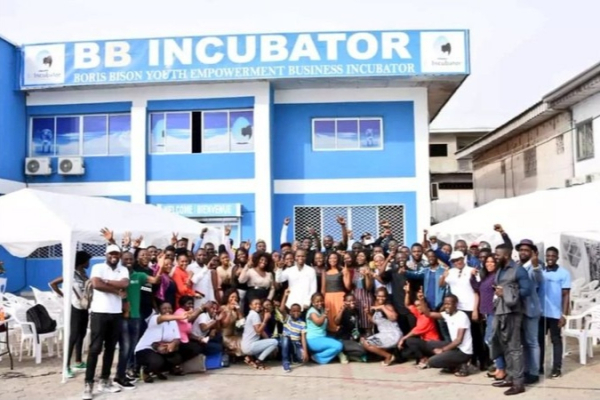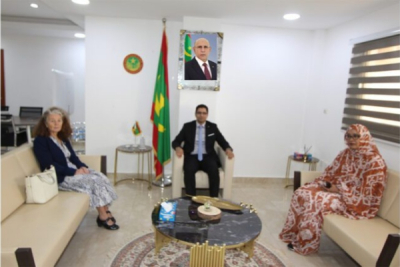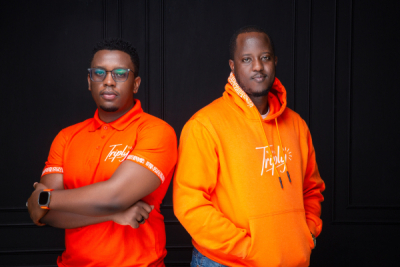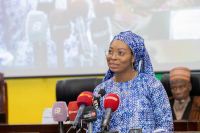BBIncubator is striving to position entrepreneurship as the cornerstone of development in Cameroon. The organization conducts various events and provides development programs for entrepreneurs.
Boris Bison Youth Empowerment Incubator (BBIncubator), a Cameroon-based incubator established in 2020, is committed to fostering an environment that enables emerging entrepreneurs to achieve their aspirations.
The incubator’s vision is to empower young Cameroonians aged between 18 and 35 to combat poverty and job scarcity by establishing successful businesses, according to its website.
Under the leadership of founder and CEO Boris N. Ngala, BBIncubator offers workspace, guidance, mentorship, and coaching to the innovative startups it identifies. The incubator’s objective is to empower businesses to generate consistent profits for the development of the Cameroonian community.
In 2023, BBIncubator launched its inaugural Tech Pitch competition, “Finance your Startup,” for young Cameroonian entrepreneurs. The competition allows entrepreneurs to present their technological ideas to a panel of judges, with the winner receiving startup financing of XAF1 million (approximately USD 1,600).
BBIncubator also initiates an incubation program every three months to mentor, train, and advise young entrepreneurs. The program offers insights into company operations and trains entrepreneurs in the use of the Internet and modern payment gateways.
Incubatees have access to BBIncubator’s computing equipment, cloud services, and broadband internet connection, as well as a laboratory for IoT (Internet of Things) and ICT (Information and Communication Technology) prototyping. The incubator also organizes networking events and conferences and provides entrepreneurs with access to seed capital.
Through its programs and activities, BBIncubator aims to assist new businesses in overcoming their daily challenges.
Melchior Koba
An experienced business leader, he is passionate about developing solutions that improve the quality of life of Africans. As an entrepreneur, he specializes in renewable energy.
Thony Ngumbu (photo), a Congolese entrepreneur and co-founder and CEO of Mwinda Technologies, is committed to designing clean energy solutions and financing options. His startup aims to address the lack of reliable energy and financial inclusion in sub-Saharan Africa.
Established in 2018, Mwinda Technologies is a U.S.-based cleantech and fintech company that launched operations in the Democratic Republic of Congo in 2019. The company offers a variety of renewable energy solutions, including the installation of solar panels for residential, commercial, and industrial customers. It designs battery storage systems to provide electricity in the event of grid failure and maintains solar and battery backup systems.
In collaboration with its partners, Mwinda Technologies offers short-term supplier credit for the hybrid solar systems it manufactures or battery backup systems. It also enables customers to purchase their solar systems by paying in installments, with the option to repay their debt using mobile money from their mobile phone.
Before Mwinda Technologies, Ngumbu founded Genesis Ventures in 2014, where he served as managing partner until 2018. Genesis Ventures is a strategy and business development consultancy dedicated to creating high-growth, high-impact businesses on the African continent, operating in sectors including agriculture, energy, mining, transport, and infrastructure.
Ngumbu, a U.S. Army veteran, holds a bachelor’s degree in political science and economics from the University of Houston and a master’s degree in business administration from Rice University’s Jones Graduate School of Business. He also studied computer science at Wartburg College.
His professional career began in 2002 at Verizon Wireless, a cellular phone provider, where he served as a senior technical analyst. From 2013 to 2016, he was the senior director of programs, operations, and resource development at IEDA Relief, a non-governmental organization that assists vulnerable people worldwide.
Melchior Koba
On April 2, Mauritania’s Minister for Digital Transformation, Innovation, and Modernisation of the Administration, Mohamed Abdallah Ould Louly, met with Leila Peters Yahya, the Resident Coordinator of the United Nations System in Mauritania. The meeting, held in Nouakchott, centered on exploring opportunities to enhance cooperation, particularly in digitization.
Despite the launch of several investment vehicles at the start of the year, investment in African startups continued its downward trend in 2024, following a decline in funding in 2023 compared to 2022.
African startups raised a total of $466 million in the first quarter of 2024, marking a 47% decrease compared to the same period in 2023, according to data released on April 3 by Africa: The Big Deal, a database that tracks funding exceeding $100,000 raised by African startups.
The logistics sector, led by a significant deal involving Nigerian startup Moove, which received a $100 million investment from Uber, surpassed the fintech sector, raising a total of $151 million. Fintech followed closely with $105 million, while the agrifoodtech sector completed the top three with $50 million.
Notably, 87% of these funds were raised by startups from Nigeria ($160 million), Kenya ($108 million), South Africa ($72 million), and Egypt ($53 million). This group, known as the Big Four, continues to dominate the African investment market, while the consistent decline in funding since 2023 has not benefited other technology ecosystems on the continent.
Outside of the Big Four, only four other African countries - Uganda ($16 million), Ghana ($10 million), Tanzania ($9 million), and Morocco ($7 million) - managed to attract more than $5 million in the first quarter of the year.
Adoni Conrad Quenum
Triply, a Kenyan startup that assists travel agencies in payment collection, operation automation, and providing customers with access to financial services, has been included in the Winter 2024 cohort of the California-based accelerator, Y Combinator. The announcement was made on April 1 by the American firm through various communication channels, including social networks and its online platform.
Launched by a tech entrepreneur whose mission is to facilitate online transactions, the solution was licensed by the Central Bank of Liberia, in October 2021.
Liberian startup eWallie, founded by Abdullah Kamara in 2021, has developed a fintech solution that allows users to send and receive money, pay bills, purchase goods and services, shop online, and pay salaries.
The mobile application, available on Android and iOS, enables users to access a range of fintech services once they download the application and complete the account creation process. Notably, eWallie features a digital wallet that facilitates these operations.
“This mobile fintech company will engage in hospital bills and school fees payment services across the country. However, we will also support resellers and distributors including SATCON utility bills to enable key services of financial transactions to have the opportunity of complete cash flow management,” Kamara said in 2021 when he secured a central bank approval for the fintech solution.
The startup has integrated its platform with several local banks and supports Visa and Mastercard, allowing customers to easily top up their wallets and conduct transactions without the need for an agent. This integration also simplifies the process of transferring cash directly to and from bank accounts.
For businesses, eWallie offers services such as salary payment, payment receipt, and stock management. Since its launch, its Android app has been downloaded over 10,000 times, according to data from the Play Store.
Adoni Conrad Quenum
Nigerian fintech firm Thepeer announced its closure in a statement released on April 1. “Our unique service had its challenges, the first being compliance issues [...]. Faced with these challenges, we needed to make a key decision either to do a hard pivot, an M&A, or return capital to investors. After carefully weighing our options, we decided that returning the remaining capital to investors was the best decision,” the start-up explained.
Founded in 2021, Thepeer has raised approximately $2.3 million, according to Crunchbase, to develop its technology and accelerate its growth.
Leveraging his technological expertise, he has developed solutions that significantly enhance the livelihoods of small-scale farmers. The transformative impact of his innovations has earned him numerous accolades and awards.
Senegalese entrepreneur Mouhamadou Lamine Kebe (photo), co-founder and CEO of Tolbi, is using technology to enhance the management and monitoring of agricultural crops, contributing to food security. Established in 2020, Tolbi is an agritech startup that develops sustainable agriculture solutions based on artificial intelligence and satellite imagery.
The company’s e-Tolbi tool aids farmers in monitoring millions of hectares of plantations. Leveraging AI and satellite imagery, the tool can estimate and predict yields, calculate input requirements, and anticipate risks associated with climate hazards, diseases, and pests.
Tolbi supports farmers by providing them access to weather information through various methods, including automated calls in the local language. This assistance helps farmers become more resilient to climate change and increase their yields and income.
Kebe, a member of the Internet Society’s executive committee since 2018 and a 2020 graduate of the Ecole Supérieure Polytechnique de Dakar, explained in 2022 why he decided to establish Tolbi. He noted that existing technologies were not adapted to the African social context, were expensive, and often in French or English, making them inaccessible in rural areas with limited internet connectivity.
Kebe, who served as a local coordinator of the China Hardware Innovation Camp program in 2019 and an advisor to the “entrepreneurship and innovation” unit at the Ecole supérieure polytechnique de Dakar in 2020, has received numerous awards for Tolbi. These include the President of the Republic’s Grand Prize for Digital Innovation in 2020 and second place in the 2021 Num-Urb competition for digital technology for urban development.
Melchior Koba
Guinea's government is pursuing initiatives to expand high-speed internet access across the country. These efforts may be bolstered by support from partners like the World Bank.
Guinea is set to be connected to a second subsea cable, as announced by Rose Pola Pricemou, the country’s Minister of Posts, Telecommunications and the Digital Economy, on March 26. The move is part of the Western Africa Regional Digital Integration Program (WARDIP), aimed at strengthening Guinea’s digital sovereignty.
“Currently, only one subsea cable connects Guinea to the rest of the world. Through the WARDIP project, we will gain a second subsea cable. It is unacceptable that in 2024, people in the most remote villages cannot access basic social services digitally. Literacy should not be a prerequisite to benefit from public services,” Pricemou said.
The government first revealed its intention to connect to a second undersea cable in February 2022 to bolster the country’s high-speed telecoms infrastructure. Since 2014, Guinea has relied mainly on the ACE (Africa Coast to Europe) cable for broadband services. However, recurrent failures on this infrastructure have disrupted internet service in the country, necessitating a second cable.
The World Bank will finance the future infrastructure under the WARDIP program. In December, the government secured $60 million to enhance internet access. According to the 2022 annual report of the local telecom regulator, ARPT, Guinea has 6.98 million mobile internet subscribers, with a penetration rate of 52%.
The deployment of this second cable is expected to not only boost infrastructure capacity through additional connectivity but also extend these services to millions more people and reduce costs. The project aligns with the government’s digital transformation ambitions.
Samira Njoya
Founded by a Guinean IT specialist, the solution was launched to enable easy access to a wide range of products. It now claims a presence in four West African countries.
Malian startup Sodishop, an e-commerce platform that allows users to purchase a variety of items online, was launched in 2019 by Guinea-born IT specialist Boubacar Biro Baldé. The platform, based in Bamako, offers Guineans the opportunity to order products from other countries in the sub-region, such as Mali, Senegal, and Côte d’Ivoire, with delivery in less than 72 hours.
“Our brand new Made in Africa marketplace now enables local Guinean brands to sell and deliver throughout Africa and anywhere else in the world,” Baldé explained.
The platform, whose Android app has been downloaded more than 10,000 times according to the Play Store, features a mobile application available on iOS and Android. While users can browse the platform without an account, one is required to place orders. The site offers a wide array of products, including food, computers, phones, gadgets, fashion items, hygiene products, and school kits.
Sodishop has integrated payment solutions such as Orange Money, Paypal, and bank cards like Visa and Mastercard. Speaking to Guineenews in August 2023, Baldé revealed that since its launch, the startup has processed over $4 million in orders and averages $500,000 in annual sales through its sellers.
“We are present in four countries in West Africa. Mali and Guinea since 2019 and 2020 respectively, Senegal since 2022, and we’ve been operational in Côte d’Ivoire since early 2023,” Baldé said.
Sodishop has received numerous awards, including the prize for the best online sales platform in Mali at the 2022 Africa Business Excellence Awards. That same year, it participated in the Top 35 MEST Africa Challenge Ghana. In 2023, it was selected as one of the Top 11 in the Afritech Startupbootcamp ASIP program, receiving technical support worth $750,000 and a three-month acceleration program in Dakar, Senegal.
Adoni Conrad Quenum
More...
A serial entrepreneur, he aims to maximize the profits of small and medium-sized businesses. His entrepreneurial career has won him national and international awards.
Ugandan entrepreneur Daniel Mukisa (photo), co-founder and CEO of Ridelink, is leveraging technology to provide transport and logistics services to small and medium-sized businesses across Africa and beyond.
Mukisa was motivated to find a solution to the high transport costs that were impacting the profitability of small businesses. "I noticed that a lot of the proceeds from the store went towards transporting the produce from the farmer to us the retailers. I challenged myself to come up with a solution that would curb the high transport costs that ate deep into the bottom line of the small businesses," he explained in 2021.
Established in 2017, Ridelink uses artificial intelligence and machine learning to connect SMEs with over 10,000 drivers and more than 3,000 other businesses on similar routes, helping them reduce costs. The platform, accessible via web and mobile app, also offers security features, allowing users to track and trace their cargo. The company’s goal is to help SMEs increase revenues, enhance mobility efficiency and performance, and access new markets.
Mukisa, a 2017 Bachelor of Commerce graduate from Makerere University, co-founded Transporter Corporation in 2014 before launching Ridelink. Transporter Corporation, where Mukisa served as head of operations until 2017, offers motorbike delivery solutions in Kampala, Uganda.
Mukisa’s entrepreneurial journey has earned him several national and international accolades. He was a recipient of the Anzisha Prize in 2015, a finalist in the 2021 Africa’s Business Heroes competition, and was named in the 2022 Forbes 30 Under 30 list, which honors young Africans who make a sbig impact through innovation.
Melchior Koba
Ghana has recently initiated a comprehensive digitization of its education system, an ambitious project aimed at equipping teachers, revamping infrastructure, and updating curricula to fully leverage the ongoing technological revolution.
Ghanaian President Nana Akufo-Addo officially inaugurated the “Smart Schools” project on Monday, March 25, a move aimed at enhancing e-learning and digitization in the country. The initiative includes the distribution of 1.3 million tablets to secondary school students across Ghana and the provision of teaching and learning management systems, digital learning content, and electronic devices to all upper secondary, technical, and vocational schools.
The government has also pledged to build 100 smart schools across the country’s 16 regions, providing a modern learning environment and digital-centric training. The first 30 schools are slated for completion by year-end, with the remaining 70 set to be finished within the next two years.
The project aligns with the National Digitisation Strategy and the Ministry of Education’s digitization program. In 2018, the Ministry of Education partnered with private entities to bolster this initiative. Additional measures to advance digital education in Ghana have been announced, including the training of 100,000 teachers in digital skills in 2022.
The government believes that this project will equip Ghana’s youth to fully engage in the fourth industrial revolution. For Education Minister Yaw Osei Adutwum, “the application of technology in education should improve student engagement, motivation, and teacher-student interactions.”
“We are committed to ensuring that by 2030, we build and upgrade education facilities that are child, disability, and gender sensitive and provide a safe, inclusive, and effective environment for all,” he added.
Samira Njoya
The digital solution was set up to facilitate the supply of goods to retailers.
Freshbag, a Cameroonian startup, has developed an agritech solution that serves as a bridge between producers or agricultural cooperatives and small retailers. The startup, founded by Brice Ludovic Bindzi Mvogo, received an undisclosed amount of funding in 2020 from GreenTec Capital, an investment fund launched in Germany in 2015 by Cameroonian-born Frenchman Eric Yong to support startups and SMEs.
Bindzi Mvogo expressed his gratitude for GreenTec Capital’s support, stating, “Thanks to Greentec, we now have a real opportunity to move into growth mode, scale our operations, and ultimately create a greater impact for the millions of street vendors across Africa. A dream now closer to becoming a reality.”
The solution does not require a mobile application. Interested parties can directly register on the startup’s web platform as sellers to join Freshbag’s network of distributors, or as producers to supply fresh produce. Following registration, the startup conducts site visits for the usual checks and to sign a partnership agreement with the user.
In September 2020, Bindzi Mvogo acknowledged the daily challenges faced by the startup stating, “The main risks are linked to the people we serve. Informal street vendors - because they live in constant uncertainty - are often unreliable and reluctant to commit to formal contracts. Our loyalty and reward programs are gradually helping to solve this problem, but we still have a long way to go to change attitudes and behavior.”
Freshbag currently boasts around 1,600 producers and 700 sellers but it plans to expand beyond Cameroon to other countries in sub-Saharan Africa.
Adoni Conrad Quenum
The initiative is designed to foster the emergence of national champions, stimulate the development of innovative digital solutions, and create value for retailers while improving the consumer experience.
Moroccan Retail Tech Builder (MRTB), a platform for incubating and accelerating retail-focused technology startups in Africa, was launched as a collaborative effort between the Ministry of Industry and Trade, Mohammed VI Polytechnique University, and the OCP Foundation.
Launched in 2022, it supports entrepreneurs from the ideation and prototyping phase to the market launch and acceleration phase, connecting project owners with experts, business leaders, and mentors. The platform also hosts events to showcase its developed and developing e-commerce solutions to potential customers and investors.
Startups under MRTB’s umbrella have access to dedicated workspaces like StartGate, a startup campus affiliated with Mohamed VI Polytechnic University. This international entrepreneurial ecosystem provides world-class infrastructure and resources to support startups.
MRTB offers several programs to foster innovation. The “Create” program assists entrepreneurs in transforming their innovative digital solution concepts into prototypes, offering three months of specialized support and culminating in a “Demo Day” for project presentations.
The “Start” incubation program supports the transition from prototype to market launch, aiding incubatees in transforming their viable business models into companies.
The “Scale” program is designed to accelerate the growth of innovative startups, providing founders with the necessary tools to develop, deploy, and increase the value of their businesses.
Through these programs and activities, MRTB aims to support the development of innovative digital solutions for around a hundred retail projects, enabling beneficiaries to modernize and create value.
Melchior Koba















